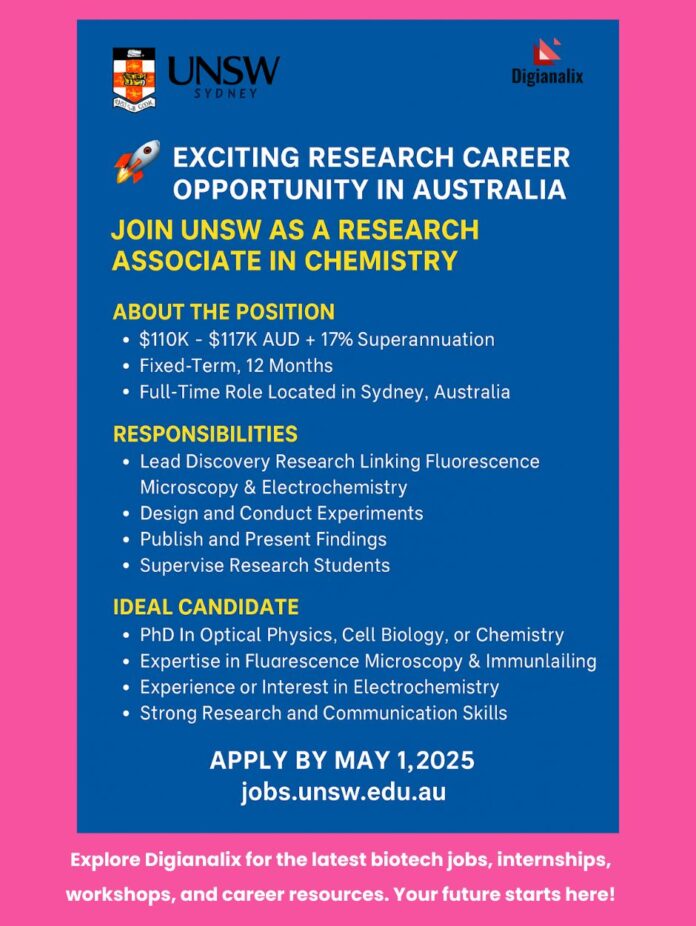Are you a passionate researcher ready to take your career global? The University of New South Wales (UNSW), one of Australia’s top research and teaching institutions, is calling for exceptional talent to join as a Research Associate in Chemistry. Located in vibrant Sydney, this is your chance to work at the cutting edge of science, collaborate with world-renowned researchers, and make a real difference in the world of fluorescence microscopy and electrochemistry.
🌟 About UNSW – A Hub for Innovation and Impact
UNSW Sydney is renowned for its strong academic community, inclusive culture, and innovative research. The School of Chemistry is a leader in scientific education and research, teaching over 2000 students annually and offering a robust undergraduate and postgraduate curriculum. This role is part of the Smart Materials and Surfaces Research Group, under the leadership of Scientia Professor Justin Gooding, and is funded through a prestigious ARC Discovery Grant.
🧪 About the Position – Research Associate (Chemistry)
Location: Sydney, Australia
Job Type: Full-time, Fixed-term (12 months)
Salary: $110,000 – $117,000 AUD + 17% superannuation + annual leave loading
Deadline to Apply: May 1, 2025
This exciting role is ideal for individuals with a PhD in optical physics, cell biology, or chemistry, and a deep interest in super-resolution microscopy and electrochemical applications in imaging.
🔬 Key Responsibilities
- Lead groundbreaking research combining fluorescence microscopy and electrochemistry.
- Design and execute experiments focused on single molecule localisation microscopy.
- Analyze data and communicate findings through publications and conferences.
- Collaborate with a multidisciplinary team and contribute to grant success.
- Mentor students and assist in supervision.
- Maintain health and safety compliance and uphold UNSW’s Code of Conduct.
🎯 Ideal Candidate Profile
To succeed in this role, you should have:
- A PhD in optical physics or cell biology, with a focus on fluorescence microscopy.
- Strong hands-on expertise in immunolabeling, microscopy, and ideally, some exposure to electrochemistry.
- Proven ability to conduct high-quality, independent research.
- Experience in academic publishing and presenting at scientific events.
- Excellent communication, teamwork, and problem-solving skills.
- A strong alignment with UNSW’s commitment to diversity, equity, and inclusion.
🌏 Why Join UNSW?
- World-Class Research Facilities and interdisciplinary collaboration opportunities.
- Located in beautiful Sydney, offering a high quality of life and diverse cultural experiences.
- Be part of an institution that values academic excellence, innovation, and global impact.
- Enjoy competitive salary packages, supportive mentorship, and access to professional development.
📩 How to Apply
Interested candidates must apply online via the official UNSW Careers Portal. Applications sent directly to the contact email will not be accepted. Be sure to systematically address the selection criteria in your application.
Contact for Queries:
Prof. Justin Gooding
📧 justin.gooding@unsw.edu.au
✅ Final Thoughts
If you’re ready to elevate your research career in Australia and contribute to innovative science that matters, this role is for you. Whether you’re an early-career researcher or looking to step into a leading scientific role, UNSW offers a dynamic environment to thrive and innovate.
🕐 Apply before May 1st, 2025 and take the next step in your journey to becoming a global research leader.
Keywords: Research Associate Chemistry Jobs in Australia, UNSW Careers, Sydney Research Jobs, Fluorescence Microscopy Research Australia, Electrochemistry and Imaging Jobs, Academic Jobs in Australia, Postdoc Chemistry Australia, UNSW Faculty Recruitment, ARC Discovery Project, Smart Materials Research.




